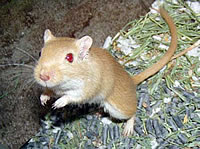Scientists reverse age related reduction in learning and memory capacity
A team of researchers from the Max Planck Institute for experimental medicine in Germany believe they have identified the neurophysiological process responsible for the decline in learning and memory capacities that all people experience with aging. Furthermore, in experiments on mice, the team were able to reverse the decline, offering the possibility that a similar treatment could also halt the loss of learning and memory capacity in humans. In the study, groups of young mice aged 4 to 6 months, and older mice aged 22 to 24 months, had to learn that a defined tone was associated with a mild electronic shock. Neither group showed learning difficulties when the tone was immediately followed by the shock, but when there was a few seconds delay between the two, making the learning task far more complex, the aged mice were strongly impaired compared with the younger ones. The researchers noticed that in the region of the brain known to be important for learning and memory functions, the hippocampus, older mice displayed highly elevated levels of a calcium activated potassium channel known as the SK3 channel. When the team reduced the production of SK3 channels in the hippocampus of aged mice, the impairment in learning and memory capacity observed in earlier experiments disappeared. Joachim Spiess, head of the department of molecular neuroendocrinology at the Max Planck Institute, said: 'Although it is anticipated that not a single gene, but rather a large number of genes is responsible for cognitive impairments induced by aging, it seems promising from a therapeutic standpoint that interference with a single ion channel [...] can overcome certain age dependent memory deficits.' Another member of the research team, Thomas Blank, adds: 'An intervention that selectively reduces the function of SK3 channels may therefore be a novel [...] approach for pharmacological treatments that might relieve or even prevent memory deficits associated with aging.'
Countries
Germany



